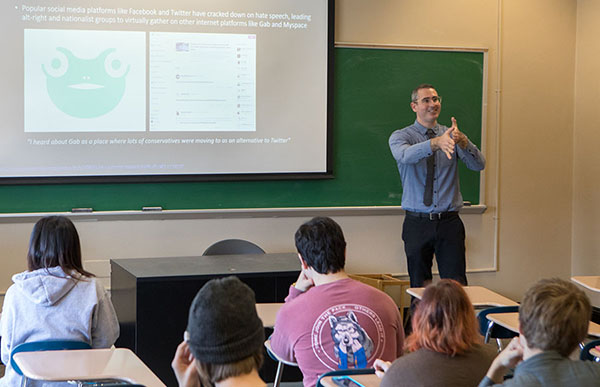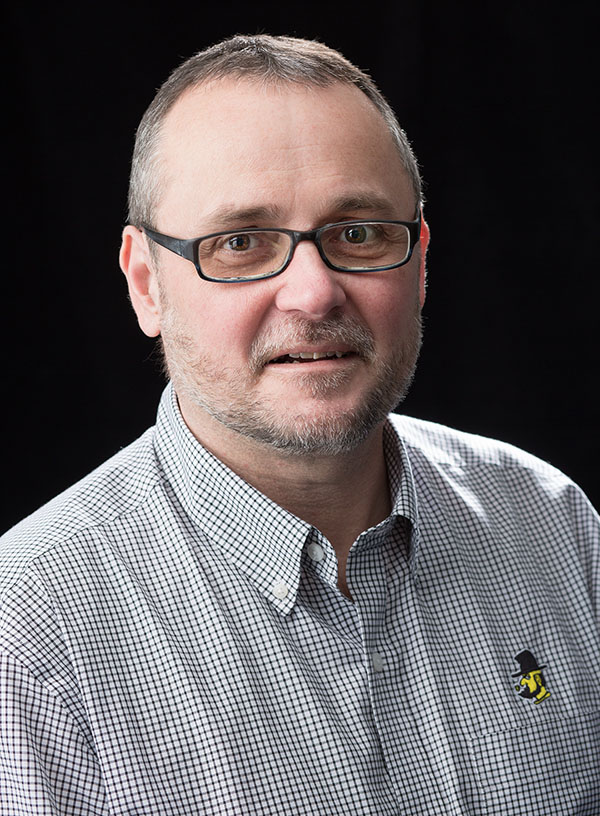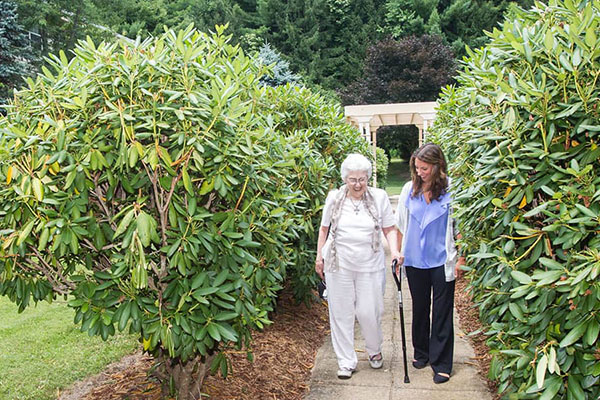BOONE, N.C. — Appalachian State University’s former gerontology graduate certificate has a new name — the graduate certificate in aging, health and society. The re-designed program prepares students for careers requiring graduate-level knowledge and skills relating to aging populations and their health in contemporary society.
The program, which is offered through the College of Arts and Sciences’ Department of Sociology, gives participants the opportunity to enhance the rapidly growing older adult population’s quality of life by helping them access the programs, services, health care and housing options they need.
The former gerontology program at Appalachian — the first graduate gerontology program in North Carolina — was founded in 1989 by Dr. A.M. Denton, along with gerontologists Dr. Ed Folts and Dr. Ed Rosenberg, who joined the Department of Sociology faculty in 1991. Gerontology is the comprehensive study of the biological, psychological and social aspects of aging.
In the fall of 2000, Rosenberg became the program director and, in 2003, implemented the graduate certificate in gerontology based on a statewide survey of professionals in the age-related workforce to address perceived need for further training or education in the field. It was the first completely online program offered at Appalachian.
“Gerontology is by definition multidisciplinary, but it is also true that health and health care comprise a major dimension of gerontology,” said Rosenberg, professor in the Department of Sociology. “Thus, it was determined to redesign the gerontology certificate as the aging, health and society certificate to incorporate and address direct health issues, such as health disparities, and to meet professional development and educational needs.”
According to the North Carolina Department of Health and Human Services (NCDHHS), currently, about 14 percent of North Carolina’s population is age 65 or older, and this demographic is projected to grow to 20 percent by 2030. For comparison, 20 percent of the state of Florida’s current population is age 65 or older (Demographics Research Group, University of Virginia). By 2025, 86 of North Carolina’s 100 counties will have more people over the age of 60 than under the age of 18 (NCDHHS).
Rosenberg said families are changing in three important ways:
- People are living longer, and since federal and state funding of programs and services for elderly people is unpredictable, more persons will need some support from their families. Already, 80 percent of care for older adults is provided informally, usually by family and friends.
- For many decades, families have been having fewer children, meaning there are fewer family members to provide elder care support.
- More women are in the workforce, full or part time, which has left fewer caregivers for elderly family members and/or created more strain for adult children trying to balance work and caregiving.
The emphasis of the aging, health and society program at Appalachian is on knowledge about the sociological and related processes of normal aging coupled with a focus on the variety of social factors that influence aging and health outcomes. Theory, research and professional career preparation are a focal point, as well as knowledge and understanding of public policies that pertain to older populations in general and the delivery and availability of health care.
Dr. Bradley Nash Jr., graduate program director and professor in the Department of Sociology, said, “What makes the program different is that by only requiring four online graduate courses, the certificate is attractive to a variety of students. For example, those individuals that have a master’s degree or are working toward one can add the certificate to better position themselves in the job market.”
He added, “Health care, social work and related professionals who are already in the workforce can enhance their knowledge regarding the many social issues impacting older adults and their well-being. The program may also be attractive to an array of community service organization personnel or even family members who may simply want to better understand and take care of their aging loved ones.”
Nash became the new graduate program director in July 2017, and two new faculty members will assist him in steering the program toward the future — Drs. Anastacia Schulhoff and David Russell, both assistant professors in the Department of Sociology.
Schulhoff completed her Ph.D. in sociology from the University of Missouri-Columbia and joined Appalachian in 2017 after teaching at Texas A&M-Central Texas. Her research and teaching interests include culture and identity, social inequalities, race and ethnicity, Native Americans/Indigenous peoples, aging and life course, gerontology, ethnography/digital ethnography and narrative identity. She is a member of many professional organizations, including the American Sociological Association (ASA) and Sociologists for Women in Society (SWS).
Russell completed his Ph.D. in sociology from Florida State University and also joined Appalachian in 2017. Previously, he was a postdoctoral research fellow (2007–09) at the Institute for Health, Health Care Policy and Aging Research at Rutgers University, and in 2009–17, he was the senior evaluation scientist at the Center for Homecare Policy and Research, which is part of the Visiting Nurse Service of New York (VNSNY). He has published widely in the fields of gerontology, medical sociology and health services research.
Application deadlines for the graduate aging, health and society program — a flexible, online, 12-semester-hour distance education program — are twice a year. For spring semester, applications are due by Nov. 1, and for fall, applications are due by July 1. This program follows a cohort format, which means a group of students is chosen from an applicant pool each semester to work through the program together. Coursework is delivered via AsULearn, Appalachian’s online learning management system.
Students enrolled in the program are encouraged to develop their own unique aging and health- related areas of specialization. Past creative examples include the aging of the inmate population and the growth of eating disorders among middle-aged women. Faculty assist students with their research, which can add to the knowledge base with hands-on experience, conference presentations and/or publications.
The aging, health and society program is approved by the North Carolina Division of Health Service Regulation to offer the assisted living administrator-in-training program leading to assisted living facility administrator licensure.
“I have not been able to find any evidence that a master’s degree versus a certificate in this field confers an advantage in terms of finding a job, salary, occupational prestige or job security. This certificate is arguably just as valuable an achievement in half the time and at half the cost,” Rosenberg said.
The Department of Sociology at Appalachian, in addition to this graduate certificate, offers an undergraduate concentration in sociology of health and aging for sociology majors.
For more information, contact Nash at [email protected] or 828-262-2486. For application assistance or questions, contact the graduate program manager in Appalachian’s Office of Distance Education at 800-355-4084 or 828-262-3113.
About the Department of Sociology
The Department of Sociology offers a Bachelor of Arts and seven Bachelor of Science concentrations (applied research methods; criminology; families and intimate relationships; health and aging; power and social change; social inequalities; and individually designed, which requires departmental approval). The department also offers minors in sociology and health and aging, plus two online graduate certificates: aging, health and society, and sociology. Learn more at https://soc.appstate.edu.
About the College of Arts and Sciences
The College of Arts and Sciences (CAS) at Appalachian State University is home to 17 academic departments, two centers and one residential college. These units span the humanities and the social, mathematical and natural sciences. CAS aims to develop a distinctive identity built upon our university's strengths, traditions and locations. The college’s values lie not only in service to the university and local community, but through inspiring, training, educating and sustaining the development of its students as global citizens. More than 6,800 student majors are enrolled in the college. As the college is also largely responsible for implementing App State’s general education curriculum, it is heavily involved in the education of all students at the university, including those pursuing majors in other colleges. Learn more at https://cas.appstate.edu.
About App State Online
Recognized as one of the top online education destinations in the country by U.S. News & World Report, App State Online is designed to meet students wherever they are — whether they are seeking a degree, a credential or looking to sharpen their personal and/or professional skills. Through App State Online, Appalachian State University offers innovative, flexible and accredited undergraduate and graduate programs. Learn more at https://online.appstate.edu.
About Appalachian State University
As a premier public institution, Appalachian State University prepares students to lead purposeful lives. App State is one of 17 campuses in the University of North Carolina System, with a national reputation for innovative teaching and opening access to a high-quality, cost-effective education. The university enrolls more than 21,000 students, has a low student-to-faculty ratio and offers more than 150 undergraduate and 80 graduate majors at its Boone and Hickory campuses and through App State Online. Learn more at https://www.appstate.edu.
What do you think?
Share your feedback on this story.







![How NCInnovation Is Rethinking Economic Development in North Carolina [faculty featured]](/_images/_posts/2026/02/rethinking-economic-development-600x400.jpg)







